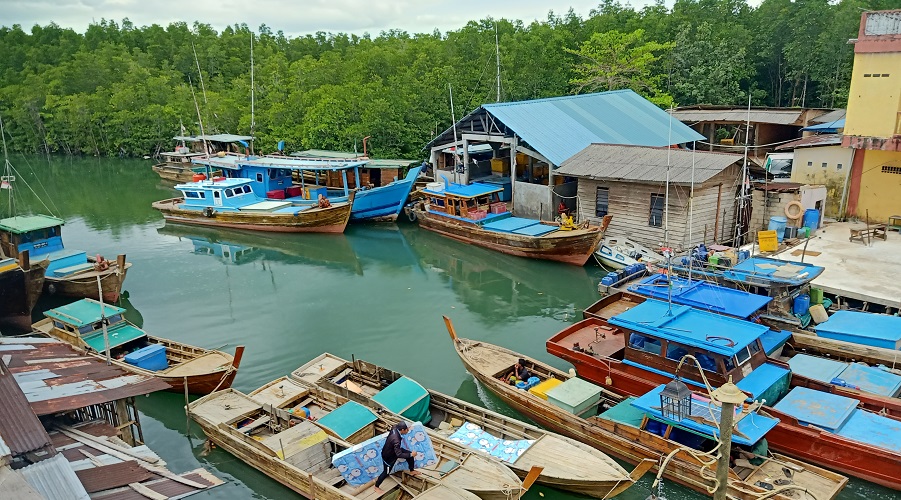Certain policies and policing measures taken by countries to combat illegal, unreported and unregulated (IUU) fishing drive local actors to engage in piracy, new research has found.
In a paper in Political Geography, an international team of researchers uses a vast literature review on global piracy and dives into evidence from Indonesian waters to argue that when constraints are placed on illegal fishing at the local level, there is an increase in the likelihood of piracy attacks to be perpetrated by local fishers, particularly if they are close to areas with high vessel traffic.
“We have all heard or read about how industrial and – sometimes illegal – eco-system-destructive fishing by foreign vessels exhausts local resources and forces local fishers into sea crime, which is based on the Somali case,” Anup Phayal, lead author of the study and a researcher at the University of North Carolina – Wilmington, said. “However, the Somali model has little explanatory power outside the Greater Gulf of Aden because the capacity of the central state in Mogadishu has remained far below the average coastal state worldwide.”
Using over 60 sources related to IUU and piracy, as well as mapped information on illegal catches in Indonesia from 1990 to 2017 provided by the Sea Around Us initiative at the University of British Columbia, piracy data from the Maritime Piracy Event and Location Database, mapped data on surveillance bases and satellite nightlight data, the researchers developed a statistical model that showed that a decrease in illegal fishing and nearby vessel traffic, independently increase the odds of piracy events in an area.
“We looked into Indonesia because it is the second-largest global aquatic capture producer after China and because, on average, between 20 percent and 38 percent of the wild seafood exported from the country, at least in 2011 – the most recent date we found –, is estimated to have been caught illegally with the help of local fishers and vessels recruited by transnational criminal organizations,” said Brandon Prins, co-author of the study and Professor at the University of Tennessee, Knoxville. “These activities make the country lose over $3 billion annually.”
Following global appeals from intergovernmental organizations, the Indonesian government implemented strict measures against IUU fishing starting in 2002. Such measures ranged from mandating ships to install vessel monitoring systems to establishing fishing quotas for local and foreign vessels and limiting the use of destructive gear. This resulted in the legalization and recording of previously unreported practices, thus increasing the reported catch.
However, the mapped data also showed that the areas where there was a decline in IUU catch were, on average, two times more likely to experience piracy attacks, particularly if the place had high vessel traffic.
“The unintended consequence of curbing illegal fishing was the increase in maritime piracy. It is easier for individuals engaging in one form of illegal activity to perpetrate another, and maritime piracy is a high-risk, high-reward substitute for local actors who engage in illegal fishing,” said Sayed Riyadi, co-author and a researcher at Indonesia’s Raja Ali Haji Maritime University. “Despite regulatory progress in addressing maritime crime, capacity limitations inhibit effective surveillance of Indonesia’s sprawling maritime space.”
The researchers note that these findings should drive government officials to think about how approaches to deter or constrain an activity through detention and criminal prosecution can displace crime into other areas.
“If you take a unilateral approach and don’t deal with the root causes of these issues, such as food insecurity, poverty, and joblessness, government efforts to counter the illicit harvesting of marine resources at the local level can inadvertently shift effort from fishing to piracy,” said Maria ‘Deng’ Palomares, co-author of the paper and project manager of the Sea Around Us initiative. “To our knowledge, this is the first study to establish a negative association between maritime piracy incidents at the local level and illegal fishing. At least in Indonesia, the two practices are substitutive.”
The authors suggest that future studies can assess whether or how government measures to check illegal fishing may offset the cost of piracy.
“It’s important to note that this research does not refute the notion that foreign trawlers produce dissatisfied local fishers who turn towards piracy as a defense against foreign intruders,” said Daniel Pauly, co-author of the paper and principal investigator of the Sea Around Us. “But it questions its intrinsic and relatively simplistic argument that illegal fishing is only done by foreign criminals, seemingly acknowledging the nationalistic narrative of the perpetrators seeking to justify their actions. Illegal fishing is more complex, often consisting of the nexus between foreign and local perpetrators.”
The paper “All maritime crimes are local: understanding the causal link between illegal fishing and maritime piracy” will appear in Political Geography doi: https://doi.org/10.1016/j.polgeo.2024.103069
[Drs. Anup Phayal & Brandon Prins received funding for this project from the U.S. Department of Defense, Office of Naval Research, through the Minerva Initiative, award #N00014-21-1-2030.]


